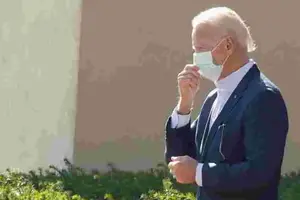
Progressives think President-elect Joe Biden's policies do not go far enough. President Donald Trump and his administration have called Mr Biden a Trojan horse for the radical left.
Since the Democratic primary, Mr Biden has shifted leftward on issues including healthcare, climate change and education. But even then, he has hardly embraced the bold agenda of progressives like Senator Bernie Sanders of Vermont.
Here is where Mr Biden actually stands on several key issues:
Coronavirus
Mr Biden made combating the pandemic a central message of his campaign for months, arguing that the nation would be better off if he were in charge.
His plans for addressing the outbreak include improved testing, expanded production of personal protective equipment, safe vaccine development and the safe reopening of schools. He has vowed to do "whatever it takes" to stop the pandemic from continuing to spread, including lockdowns if scientists recommend them.
Mr Biden has also said he'll ask governors to institute a mask mandate in their states; if they refuse, he'll work with local officials to get mandates in place. And he has said he'll impose a national mask mandate in federal buildings and on interstate transportation.
ConcerningDr Anthony Fauci, the nation's top infectious disease expert, Mr Biden says that he hopes Dr Fauci will also serve in his administration.
Healthcare
Mr Biden supports expanding the Affordable Care Act and creating a public optiona plan he has nicknamed Bidencare. He has denounced Republican efforts to overturn the healthcare law, and he has vowed to ensure that Americans with pre-existing conditions will continue to have access to healthcare.
He doesn't support the universal, single-payer healthcare proposal known as "Medicare for All" that is advocated by progressives including Mr Sanders. And he doesn't support eliminating private insurance. But in a concession to progressives, he announced in April a plan to lower the Medicare eligibility age to 60 from 65.
Mr Biden has also pledged to "reduce the premiums and reduce drug prices by making sure that there's competition that doesn't exist now by allowing Medicare to negotiate drug prices with the insurance companies."
Economy
Mr Biden has a sweeping economic recovery plan, under the moniker "Build Back Better," that promises to create millions of job. In his plan, Mr Biden has tied the economic revival to tackling climate change, racial equity and reinvestment in US manufacturing.
Among his proposals are a US$300 billion (S$404 billion) increase in government spending on research and development of technologies, like electric vehicles and 5G cellular networks, and an additional US$400 billion in federal procurement spending on products that are manufactured in the United States.
To discourage US companies from moving jobs to other countries, known as offshoring, he proposed a 10 per cent "offshoring penalty surtax" that would apply to "profits of any production by a United States company overseas for sales back to the United States."
Mr Biden has also said he'll change the tax code to reward companies for investing in domestic production. And he has promised to take executive action to ensure the purchase of US goods in the federal procurement process.
Taxes
Mr Biden wants to partially repeal the Trump tax overhaul, rolling back tax cuts for corporations and the highest earners. He has proposed increasing the corporate tax rate to 28 per cent, from 21 per cent.
But he has said that he'll keep tax cuts in place for other households, including those in the middle class, and he has promised that no one making less than US$400,000 will pay higher taxes.
Overall, Mr Biden's proposals would increase tax revenue by an estimated US$3.4 trillion over a decade, according to an analysis by the Penn Wharton Budget Model at the University of Pennsylvania. Eighty per cent of the increase would fall on the top 1 per cent, according to the analysis.
As a result of lower wages and investment returns, the Penn Wharton analysis found that the after-tax income of households earning less than US$400,000 would decrease by 0.9 per cent on average. But there would be a far steeper average drop in after-tax income for households earning more than US$400,000: 17.7 per cent.
The Biden campaign has argued that the Penn Wharton analysis presents an incomplete picture because it doesn't take into account a number of tax-related proposals put forth by the campaign that it says will benefit those in the middle class.
Climate Change
Mr Biden laid out a plan over the summer to spend US$2 trillion to develop clean energy and eliminate emissions from the power sector by 2035. Besides the coronavirus pandemic, the resulting economic crisis and racial injustice, he has referred to climate change as one of four "historic crises" that the United States is facing.
But notably, he has declined to support the Green New Deal, a sweeping climate plan embraced by progressive groups and criticised by Republicans, although his website calls it a "crucial framework."
And while Mr Trump has accused Mr Biden of wanting to "ban fracking," Mr Biden has repeatedly said he'll not do so. Instead, he has proposed ending the permitting of new fracking on federal lands, but he is not proposing a national ban.
During the last presidential debate, Mr Biden also said he would push the country to "transition away from the oil industry" and end federal subsidies. He afterwards tried to clarify his remarks, saying, "We're getting rid of the subsidies for fossil fuels, but we're not getting rid of fossil fuels for a long time."